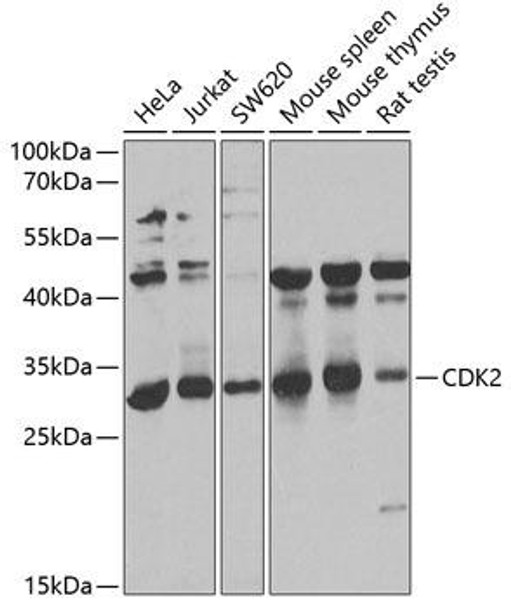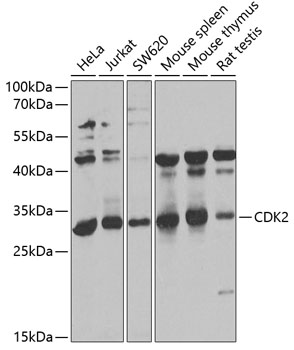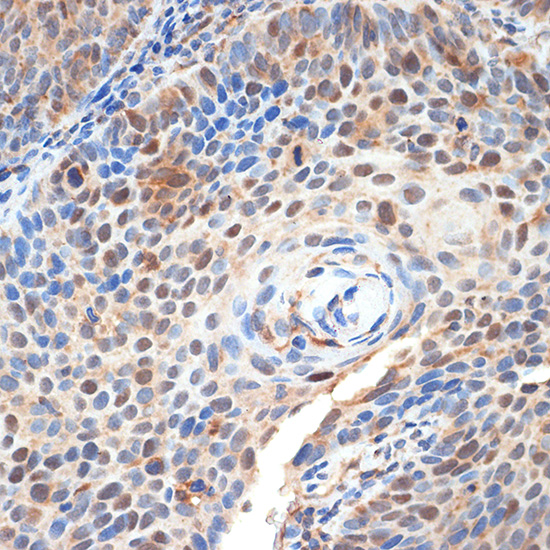Anti-CDK2 Antibody (CAB0294)
- SKU:
- CAB0294
- Product type:
- Antibody
- Reactivity:
- Human
- Mouse
- Rat
- Host Species:
- Rabbit
- Isotype:
- IgG
- Antibody Type:
- Polyclonal Antibody
- Research Area:
- Cell Cycle
Description
| Antibody Name: | Anti-CDK2 Antibody |
| Antibody SKU: | CAB0294 |
| Antibody Size: | 20uL, 50uL, 100uL |
| Application: | WB IHC |
| Reactivity: | Human, Mouse, Rat |
| Host Species: | Rabbit |
| Immunogen: | A synthetic peptide of human CDK2 |
| Application: | WB IHC |
| Recommended Dilution: | WB 1:500 - 1:2000 IHC 1:50 - 1:100 |
| Reactivity: | Human, Mouse, Rat |
| Positive Samples: | HeLa, Jurkat, SW620, Mouse spleen, Mouse thymus, Rat testis |
| Immunogen: | A synthetic peptide of human CDK2 |
| Purification Method: | Affinity purification |
| Storage Buffer: | Store at -20°C. Avoid freeze / thaw cycles. Buffer: PBS with 0.02% sodium azide, 50% glycerol, pH7.3. |
| Isotype: | IgG |
| Sequence: | Email for sequence |
| Gene ID: | 1017 |
| Uniprot: | P24941 |
| Cellular Location: | Cajal body, Cytoplasm, Endosome, Nucleus, centrosome, cytoskeleton, microtubule organizing center |
| Calculated MW: | 30kDa/33kDa |
| Observed MW: | 34kDa |
| Synonyms: | CDK2, CDKN2, p33(CDK2) |
| Background: | This gene encodes a member of a family of serine/threonine protein kinases that participate in cell cycle regulation. The encoded protein is the catalytic subunit of the cyclin-dependent protein kinase complex, which regulates progression through the cell cycle. Activity of this protein is especially critical during the G1 to S phase transition. This protein associates with and regulated by other subunits of the complex including cyclin A or E, CDK inhibitor p21Cip1 (CDKN1A), and p27Kip1 (CDKN1B). Alternative splicing results in multiple transcript variants. |
| UniProt Protein Function: | CDK2: a protein kinase of the CDK family. An important component of the cell cycle machinery. Activity of CDK2 is maximal during S phase and G2. Cdk2/cyclin E kinase activity is important for the G1 to S transition and phosphorylates the Rb protein. In S-phase, active cdk2/cyclin A complexes predominate and phosphorylate E2F, and the active cdk2 complex persists in the nucleus through G2. Part of the Rb pathway disregulated in most tumors. Target of several candidate cancer drugs. However, inhibition does not always prevent cancer cell growth, possibly due to CDK redundancy. Inhibitors: BMS-265246, BMS-265246-01, R-roscovitine (CYC200, CYC202), SU9516, R547, L868276 |
| UniProt Protein Details: | Protein type:Kinase, protein; EC 2.7.11.22; Protein kinase, CMGC; Protein kinase, Ser/Thr (non-receptor); Cell cycle regulation; CMGC group; CDK family; CDK1 subfamily; CDK/CDK1 subfamily Chromosomal Location of Human Ortholog: 12q13 Cellular Component: Cajal body; centrosome; chromosome, telomeric region; X chromosome; condensed chromosome; cytosol; Y chromosome; nucleoplasm; transcription factor complex; cytoplasm; cyclin-dependent protein kinase holoenzyme complex; nucleus; endosome Molecular Function:cyclin binding; protein binding; cyclin-dependent protein kinase activity; metal ion binding; histone kinase activity; ATP binding Biological Process: G1 DNA damage checkpoint; meiosis; mitosis; positive regulation of transcription, DNA-dependent; histone phosphorylation; DNA repair; DNA damage response, signal transduction by p53 class mediator resulting in cell cycle arrest; peptidyl-serine phosphorylation; regulation of ubiquitin-protein ligase activity during mitotic cell cycle; anaphase-promoting complex-dependent proteasomal ubiquitin-dependent protein catabolic process; cell division; positive regulation of cell proliferation; Ras protein signal transduction; mitotic cell cycle; DNA replication; G2/M transition of mitotic cell cycle; blood coagulation; centrosome duplication; potassium ion transport; G1/S transition of mitotic cell cycle; positive regulation of DNA replication initiation |
| NCBI Summary: | This gene encodes a member of a family of serine/threonine protein kinases that participate in cell cycle regulation. The encoded protein is the catalytic subunit of the cyclin-dependent protein kinase complex, which regulates progression through the cell cycle. Activity of this protein is especially critical during the G1 to S phase transition. This protein associates with and regulated by other subunits of the complex including cyclin A or E, CDK inhibitor p21Cip1 (CDKN1A), and p27Kip1 (CDKN1B). Alternative splicing results in multiple transcript variants. [provided by RefSeq, Mar 2014] |
| UniProt Code: | P24941 |
| NCBI GenInfo Identifier: | 116051 |
| NCBI Gene ID: | 1017 |
| NCBI Accession: | P24941.2 |
| UniProt Secondary Accession: | P24941,O75100, A8K7C6, |
| UniProt Related Accession: | P24941 |
| Molecular Weight: | 30,035 Da |
| NCBI Full Name: | Cyclin-dependent kinase 2 |
| NCBI Synonym Full Names: | cyclin-dependent kinase 2 |
| NCBI Official Symbol: | CDK2 |
| NCBI Official Synonym Symbols: | CDKN2; p33(CDK2) |
| NCBI Protein Information: | cyclin-dependent kinase 2; p33 protein kinase; cdc2-related protein kinase; cell division protein kinase 2 |
| UniProt Protein Name: | Cyclin-dependent kinase 2 |
| UniProt Synonym Protein Names: | Cell division protein kinase 2; p33 protein kinase |
| Protein Family: | Cyclin-dependent kinase |
| UniProt Gene Name: | CDK2 |
| UniProt Entry Name: | CDK2_HUMAN |






![Anti-CDK2 Antibody (CAB18000)[KO Validated] Anti-CDK2 Antibody (CAB18000)[KO Validated]](https://cdn11.bigcommerce.com/s-39x6lpnvxv/images/stencil/590x590/products/32603/30792/anti-cdk2-antibody-cab18000ko-validated__27320__94908.1644317714.jpg?c=1)